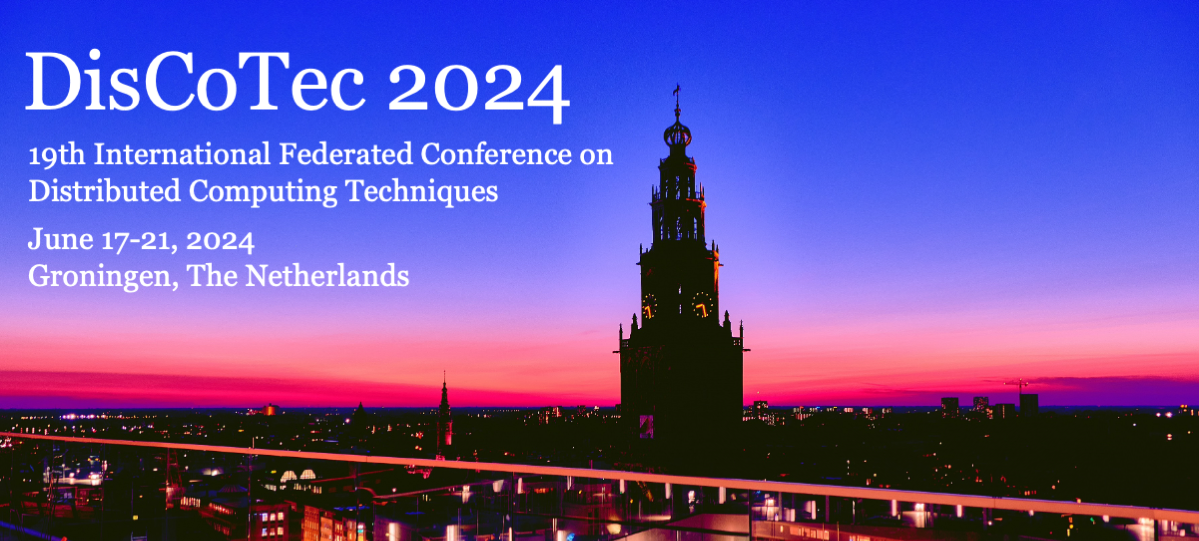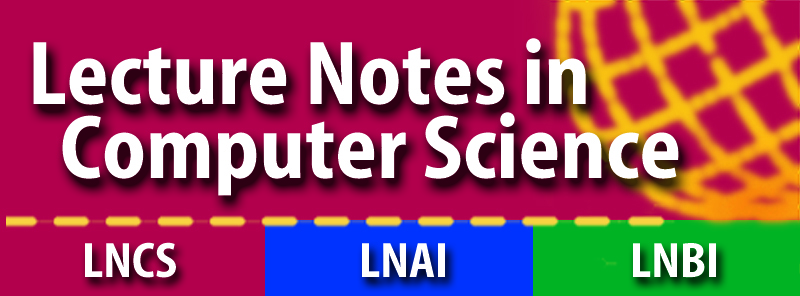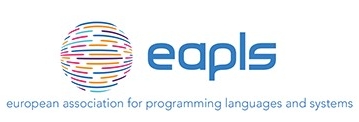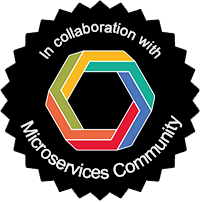 Photo by Robin Mathlener on Unsplash
Photo by Robin Mathlener on Unsplash
COORDINATION 2024 - 26th International Conference on Coordination Models and Languages
COORDINATION 2024 is one of the three conferences of DisCoTec 2024.
Scope
Modern information systems rely increasingly on combining concurrent, distributed, mobile, adaptive, reconfigurable and heterogeneous components. New models, architectures, languages and verification techniques are necessary to cope with the complexity induced by the demands of today’s software development. Coordination languages have emerged as a successful approach, in that they provide abstractions that cleanly separate behaviour from communication, therefore increasing modularity, simplifying reasoning, and ultimately enhancing software development. Building on the success of the previous editions, this conference provides a well-established forum for the growing community of researchers interested in models, languages, rchitectures, and implementation techniques for coordination.
Main topics
Topics of interest encompass all areas of coordination, including (but not limited to) coordination related aspects of:
- Theoretical models and foundations for coordination: component composition, concurrency, distribution, mobility; dynamic, spatial and probabilistic aspects of coordination; logic, types, semantics.
- Coordination of multi-agent and collective systems: models, languages, infrastructures, self-adaptation, self-organisation, distributed solving, collective intelligence and emerging behaviour.
- Coordination and modern distributed computing: web services, microservices, peer-to-peer networks, grid computing, context-awareness, ubiquitous computing, mobile computing, reversible computing.
- Session-based programming: models, languages, behavioural types, and tools.
- Models, languages, verification techniques and tools for interacting smart contracts and (blockchain-based) decentralised applications.
- Languages, methodologies and tools for secure coordination.
- Cybersecurity aspects of coordinated systems, coordinated approaches to cybersecurity.
- Nature- and bio-inspired approaches to coordination.
- Specification, refinement, and analysis of architectures: patterns and styles, verification of functional and non-functional properties, including performance and security aspects.
- Dynamic software architectures: distributed mobile code, configuration, reconfiguration, networked computing, parallel, high-performance and cloud computing.
- Coordination platforms for infrastructures of emergent new application domains, like IoT, fog- and edge-computing.
- Programming methodologies, languages, middleware, tools, and environments for the development and verification of coordinated applications, including DevOps approaches.
- Coordination in business process management: coordination models for business process management, process mining techniques and tools for coordination models.
- Industrial relevance of coordination and software architectures: programming in the large, domain-specific software architectures and coordination models, industry-driven efforts in coordination and case studies.
- Interdisciplinary aspects of coordination.
Keynote speakers
- Marieke Huisman (University of Twente, The Netherlands)
- Laura Kovács (Vienna University of Technology, Austria)
- Paulo Veríssimo (KAUST, Kingdom of Saudi Arabia)
Important dates (extended)
- Abstract submission:
February 02, 2024February 16, 2024 - Paper submission:
February 09, 2024February 23, 2024 - Paper notification:
March 29, 2024April 5, 2024 - Camera-ready: April 24, 2024
- Conference: June 18-20, 2024
Deadlines expire at 23:59 anywhere on earth on the dates displayed above.
Accepted Papers
Go to the list of accepted papers.
Awards
- COORDINATION and DisCoTec 2024 Best Paper Award: Marco Carbone and Adele Veschetti. A Probabilistic Choreography Language for PRISM.
- COORDINATION 2024 Best Artefact Award: Joao Afonso, Elvis Gerardin Konjoh Selabi, Maurizio Murgia, Antonio Ravara and Emilio Tuosto. TRAC: a tool for data-aware coordination (with an application to smart contracts).
Submissions
Submission site
https://easychair.org/conferences/?conf=coordination2024
Publication
Authors are invited to submit papers electronically in PostScript or PDF using a two-phase online submission process. Registration of the paper information and abstract (max. 250 words) must be completed according to the above submission dates and submissions are handled through the EasyChair conference management system, accessible from the above submission site.
Contributions must be written in English and report on original, unpublished work not submitted for publication elsewhere (cf. IFIP’s Author Code of Conduct, see http://www.ifip.org/ under Publications/Links). The submissions must not exceed the total page number limit (see below) prepared using Springer’s LNCS style. Submissions not adhering to the above specified constraints may be rejected without review.
Submission categories:
- Regular papers (7-15 pages, not counting references and appendices): describing thorough and complete research results and experience reports. In a clear case of need, as an exception, authors may ask for permission via email to the PC co-chairs to exceed the paper’s max length by at most 10%, under the condition that last-minute shortening would really damage the clarity of the paper or result in non-submission. The authors must make a draft of the paper available to the PC co-chairs via EasyChair.
- Short papers (4-6 pages, not counting references and appendices): describing research in progress, call for action, or opinion papers on the past of COORDINATION research, on the current state of the art, or on prospects for the years to come.
- Survey papers (16-25 pages, not counting references and appendices): describing important results and success stories related to the topics of COORDINATION.
- Tool papers (4-15 pages, not counting references and appendices): describing technological artefacts in the scope of the research topics of COORDINATION. Tool papers should provide a clear account of the tool’s functionality, discuss the tool’s practical capabilities possibly with reference to the type and size of problems it can handle, and,when applicable, report on realistic case studies (possibly providing a rigorous experimental evaluation). Tool papers may also provide an account of the theoretical foundations, including relevant citations, and present design and implementation concerns, possibly including software architecture and core data structures. Papers that present extensions to existing tools should clearly describe the improvements or extensions with respect to previously published versions of the tool, possibly providing data on enhancements in terms of resources and capabilities. Papers may contain a link to a publicly downloadable MPEG-4 demo video of at most 10 minutes length.
Artefacts
Following ACM’s definition, an artefact is “a digital object that was either created by the authors to be used as part of the study or generated by the experiment itself. For example, artifacts can be software systems, scripts used to run experiments, input datasets, raw data collected in the experiment, or scripts used to analyze results”.
To improve and reward reproducibility and to give more visibility and credit to the effort of tool developers in the COORDINATION community, authors of submitted papers are invited to submit publicly available artefacts (using permanent repositories such as Software Heritage, Zenodo, etc.), which will be associated with their paper for evaluation. Based on the result of the artefact evaluation, one or more badges may be applied to a paper. Specifically, COORDINATION uses the EAPLS badging scheme), which in its own turn is based on and consistent with the ACM initiative.
Artefact submission is mandatory for tool papers and the result of the artefact evaluation will be considered in the tool paper’s acceptance decision. Instead, artefact submission is optional for all the other paper categories and the result of the artefact evaluation will not affect the paper’s acceptance decision but may affect the best paper selection.
Dates (AoE):
- Artefact submission:
February 29, 2024March 8, 2024 - Kick-the-tires phase:
- Problem reports from reviewers:
8 March, 2024March 17 2024 - Authors’ response to reviewers:
15 March, 2024March 23 2024
- Problem reports from reviewers:
- Artefact notification:
March 29, 2024April 5, 2024
Detailed information on artefact submission and evaluation is available here.
Proceedings
The conference proceedings, consisting of accepted submissions from any paper category, will be published by Springer in LNCS-IFIP volumes.

Special issues
After the conference, selected papers from COORDINATION and FORTE programmes (except for tool papers) will be invited to a special issue of the Logical Methods in Computer Science journal. The paper submission deadline is planned for October/November 2024, and the notifications for the first round of reviews around February 2025. Selected tool papers, instead, will be invited to a special issue of a reputable journal with a track dedicated to software, like the Journal of Science of Computer Programming’s Software Track.
Proceedings and Special Issues from Previous Editions
Proceedings The proceedings of previous editions of COORDINATION are available on SpringerLink
Special Issues Special issues hosted by more recent editions of COORDINATION are listed below.
-
Selected Papers of Coordination 2019, Special Issue of Logical Methods in Computer Science, edited by Emilio Tuosto and Hanne Riis Nielsen. Available at: https://lmcs.episciences.org/volume/view/id/377
-
Selected Tool Papers of Coordination 2019, Special Issue of Science of Computer Programming, edited by Hugo Torres Vieira and Omar Inverso. Available at: https://www.sciencedirect.com/journal/science-of-computer-programming/special-issue/10H4835TWK9
-
Selected Papers of Coordination 2020, Special Issue of Logical Methods in Computer Science, edited by Simon Bliudze and Laura Bocchi. Available at: https://lmcs.episciences.org/volume/view/id/415
-
Selected Papers of Coordination 2021, Special Issue of Logical Methods in Computer Science, edited by Ferruccio Damiani and Ornela Dardha. Available at: https://lmcs.episciences.org/volume/view/id/449
-
Selected Tool Papers of Coordination 2020 and Coordination 2021, Special Issue of Science of Computer Programming, edited by Hugo Vieira, Omar Inverso and Giorgio Audrito. Available at: https://www.sciencedirect.com/journal/science-of-computer-programming/special-issue/1046VCJSPCD
-
Selected Papers of Coordination 2022, Special Issue of Logical Methods in Computer Science, edited by Maurice ter Beek and Marjan Sirjani. Available at: https://lmcs.episciences.org/volume/view/id/654
-
Selected Software Artefacts from the Papers of DisCoTec 2022 - 18th International Federated Conference on Distributed Computing Techniques, Special Issue of Science of Computer Programming, edited by Ferruccio Damiani, David Eyers and Anna Philippou. In preparation.
-
Selected Papers of Coordination and Forte 2023, Special Issue of Logical Methods in Computer Science, edited by Marieke Huisman, Sung-Shik Jongmans, Antónia Lopes, and António Ravara. In preparation.
-
Selected Software Artefacts from the Papers of DisCoTec 2023 - 18th International Federated Conference on Distributed Computing Techniques, Special Issue of Science of Computer Programming. In preparation.
Programme Committee co-chairs
- Ilaria Castellani (INRIA Sophia Antipolis, France)
- Francesco Tiezzi (University of Florence, Italy)
Publicity chair
- Saverio Giallorenzo (University of Bologna, Italy)
Programme Committee
- Giorgio Audrito (University of Turin, Italy)
- Laura Bocchi (University of Kent, UK)
- Chiara Bodei (University of Pisa, Italy)
- Marcello Bonsangue (Leiden University, The Netherlands)
- Silvia Crafa (University of Padova, Italy)
- Cinzia Di Giusto (Université Côte d’Azur, France)
- Paola Giannini (University of Piemonte Orientale, Italy)
- Hannah Gommerstadt (Vassar College, USA)
- Heerko Groefsema (University of Groningen, The Netherlands)
- Thomas Hildebrandt (University of Copenhagen, Denmark)
- Sung-Shik Jongmans (Open University of the Netherlands, The Netherlands)
- Dimka Karastoyanova (University of Groningen, The Netherlands)
- Jean Krivine (IRIF, CNRS, France)
- Eva Kühn (Vienna University of Technology, Austria)
- Roland Kuhn (Actyx, Germany)
- Alberto Lluch Lafuente (Technical University of Denmark, Denmark)
- Antónia Lopes (University of Lisbon, Portugal)
- Michele Loreti (University of Camerino, Italy)
- Mieke Massink (CNR-ISTI, Italy)
- Hernán Melgratti (University of Buenos Aires, Argentina)
- Maurizio Murgia (Gran Sasso Science Institute, Italy)
- Anna Philippou (University of Cyprus, Cyprus)
- José Proença (University of Porto, Portugal)
- Violet Ka I Pun (Western Norway University of Applied Sciences, Norway)
- Barbara Re (University of Camerino, Italy)
- Marjan Sirjani (Mälardalen University, Sweden)
- Meng Sun (Peking University, China)
- Carolyn Talcott (SRI International, USA)
- Peter Thiemann (Universität Freiburg, Germany)
- Mirko Viroli (University of Bologna, Italy)
- Franco Zambonelli (University of Modena and Reggio Emilia, Italy)
Artefact Evaluation Committee chair
- Rumyana Neykova (Brunel University London, UK)
Artefact Evaluation Committee
- Nour Ali (Brunel University London, UK)
- Tiago Cogumbreiro (UMass Boston, USA)
- Saverio Giallorenzo (University of Bologna, Italy)
- Arwa Hameed (University of Glasgow, UK)
- Keigo Imai (DeNA, Japan)
- Omar Inverso (Gran Sasso Science Institute, Italy)
- Doriana Medic (University of Turin, Italy)
- Mário Pereira (NOVA School of Science and Technology, Portugal)
- Lorenzo Rossi (University of Camerino, Italy)
- Cristina Seceleanu( Mälardalen University, Sweden)
- Felix Stutz (University of Luxembourg, Luxembourg)
- Fangyi Zhou (Amazon, UK)
Steering Committee
- Gul Agha (University of Illinois at Urbana Champaign, USA)
- Farhad Arbab (CWI and Leiden University, The Netherlands)
- Simon Bliudze (INRIA Lille, France)
- Laura Bocchi (University of Kent, UK)
- Ferruccio Damiani (University of Turin, Italy)
- Ornela Dardha (University of Glasgow, UK)
- Wolfgang De Meuter (Vrije Universiteit Brussels, Belgium)
- Rocco De Nicola (IMT School for Advanced Studies Lucca, Italy)
- Giovanna di Marzo Serugendo (Université de Genève, Switzerland)
- Tom Holvoet (KU Leuven, Belgium)
- Jean-Marie Jacquet (University of Namur, Belgium)
- Sung-Shik Jongmans (Open University of the Netherlands, Netherlands)
- Christine Julien (University of Texas at Austin, USA)
- Eva Kühn (Vienna University of Technology, Austria)
- Alberto Lluch Lafuente (Technical University of Denmark, Denmark)
- Antónia Lopes (University of Lisbon, Portugal)
- Michele Loreti (Università di Camerino, Italy)
- Mieke Massink (ISTI-CNR, Pisa, Italy) - chair
- José Proença (University of Porto, Portugal)
- Rosario Pugliese (Università di Firenze, Italy)
- Marjan Sirjani (Mälardalen University, Sweden)
- Carolyn Talcott (SRI International, California, USA)
- Maurice ter Beek (CNR-ISTI, Italy)
- Emilio Tuosto (Gran Sasso Science Institute, Italy)
- Vasco T. Vasconcelos (University of Lisbon, Portugal)
- Mirko Viroli (Università di Bologna, Italy)
- Gianluigi Zavattaro (Università di Bologna, Italy)


